
Overview
- Provides step-by-step robot development tutorials for beginners
- Combines various development scenarios to show how to develop service robots
- Suitable for students in robotics-related courses and beginners interested in intelligent robotics development
Access this book
Tax calculation will be finalised at checkout
Other ways to access
About this book
This book introduces readers to the key technologies and development methods for ROS-based intelligent robots. Covering both the development history of robots and various aspects of programming robots, it offers effective support for beginners.
The book is divided into three parts, the first of which introduces the basics of robots, including their definition, development, composition, and key technologies. In turn, the second part covers the hardware and software components and the implementation of functions such as vision, speech, grasping, and autonomous navigation. These functions need to work together to provide user-friendlier and more intelligent service. The third part shows howto develop robots with different functions in different application scenarios.
Combining theoretical and practical aspects, with a strong focus on application, this work can be used as a reference book for robotics-related courses. Moreover, it will benefit all readers who are interested in intelligent robot development, sharing essential insights into developing service robots based on ROS.
Similar content being viewed by others
Keywords
Table of contents (15 chapters)
-
Front Matter
-
Part II
-
Front Matter
-
Reviews
Authors and Affiliations
About the authors
Wenyu Li received the B.S. degree from the College of Information Technology and Science, and the Ph.D. degree from the College of Artificial Intelligence, Nankai University, in 2013 and 2019, respectively. He used to be a Visiting Ph.D. Scholar at the CAID Laboratory, University of Georgia, USA, in 2018, and engaged as a Post-Doctoral Researcher with the School of Vehicle and Mobility, Tsinghua University, China, from 2019 to 2021. He is currently an Assistant Professor at the College of Artificial Intelligence, Nankai University. His current research interests include human-vehicle cooperative control, non-zero sum differential game theory, and reinforcement learning.
Ying Tan received her BE degrees in intelligent science and technology from Nankai University, China, in 2020. She won the third place in RoboCup Japan Open 2019 @Home Education. Currently, she is a doctoral student at Nankai University, and her research interests include brain-computer interface and human-robot interaction.
Bibliographic Information
Book Title: Intelligent Robot
Book Subtitle: Implementation and Applications
Authors: Feng Duan, Wenyu Li, Ying Tan
DOI: https://doi.org/10.1007/978-981-19-8253-8
Publisher: Springer Singapore
eBook Packages: Computer Science, Computer Science (R0)
Copyright Information: The Editor(s) (if applicable) and The Author(s), under exclusive license to Springer Nature Singapore Pte Ltd. 2023
Hardcover ISBN: 978-981-19-8252-1Published: 22 February 2023
Softcover ISBN: 978-981-19-8255-2Published: 23 February 2024
eBook ISBN: 978-981-19-8253-8Published: 21 February 2023
Edition Number: 1
Number of Pages: XII, 290
Number of Illustrations: 1 b/w illustrations
Topics: Robotics, Artificial Intelligence, Control, Robotics, Mechatronics, Robotics and Automation



